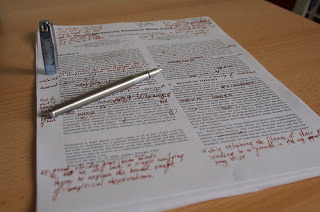The Value of an Editor
by Mary Sutton / @mary_sutton73
Apologies for the late posting today. I was going to write about JK Rowling, but something has trumped that post.
 Some writers don't like editors. They think that, somehow, letting an editor in messes with the "purity" of their story, as if the editor's goal is to rip everything to shreds and rewrite it to fit their (the editor's) own vision of the story. Or if they want an "edit," they only want a copy edit. Go find all the typos and leave the rest alone, lest you mar my beautiful creation.
Some writers don't like editors. They think that, somehow, letting an editor in messes with the "purity" of their story, as if the editor's goal is to rip everything to shreds and rewrite it to fit their (the editor's) own vision of the story. Or if they want an "edit," they only want a copy edit. Go find all the typos and leave the rest alone, lest you mar my beautiful creation.
I have a word for this: baloney.
I've been blessed to work with three wonderful editors for various projects. I'm working with a fourth for Wedding Bells: Hero's Sword Vol. 3. I will admit to feeling a little nervous when the new editor was introduced. Would he like the story?
Being a professional, he went back and read the first two books. I'm happy to report he liked them, and he liked Wedding Bells, saying it might be his favorite of the three. Yay!
However, that doesn't mean the manuscript didn't come back with suggestions and changes: everything from grammar corrections to suggestions on word choices. Plenty of red marks, that's for sure.
And you know what? All of it resulted in a better, tighter story. I did a lot of nodding as I read his comments. he didn't change my story - he made it better.
I had a similar experience with my first Laurel Highlands story. I submitted it and it got rejected a couple times. I worked with an editor. I incorporated her suggestions/changes. And I sold the story.
That's what a good editor does. It's not about changing or remaking the story. It's about elevating it. Because face it, authors; after staring at your manuscript for days/weeks/months/years, you can't see the weak spots any more. You need fresh eyes to come in a say, "You've used 'hurry' three times in three successive paragraphs; pick something else," or "Strengthen the scene with a little more/less description."
A good editor is worth his/her weight in gold. Yeah, you might have to work with a couple different ones (if you are self-publishing), but when you find one, hold on tight. Your editor is not your opposition, she's your partner. Together, you'll work together to make a great book for your reader.
And isn't that really what it's all about?
Image courtesy of Nic McPhee, used under Creative Commons
Apologies for the late posting today. I was going to write about JK Rowling, but something has trumped that post.
 Some writers don't like editors. They think that, somehow, letting an editor in messes with the "purity" of their story, as if the editor's goal is to rip everything to shreds and rewrite it to fit their (the editor's) own vision of the story. Or if they want an "edit," they only want a copy edit. Go find all the typos and leave the rest alone, lest you mar my beautiful creation.
Some writers don't like editors. They think that, somehow, letting an editor in messes with the "purity" of their story, as if the editor's goal is to rip everything to shreds and rewrite it to fit their (the editor's) own vision of the story. Or if they want an "edit," they only want a copy edit. Go find all the typos and leave the rest alone, lest you mar my beautiful creation.I have a word for this: baloney.
I've been blessed to work with three wonderful editors for various projects. I'm working with a fourth for Wedding Bells: Hero's Sword Vol. 3. I will admit to feeling a little nervous when the new editor was introduced. Would he like the story?
Being a professional, he went back and read the first two books. I'm happy to report he liked them, and he liked Wedding Bells, saying it might be his favorite of the three. Yay!
However, that doesn't mean the manuscript didn't come back with suggestions and changes: everything from grammar corrections to suggestions on word choices. Plenty of red marks, that's for sure.
And you know what? All of it resulted in a better, tighter story. I did a lot of nodding as I read his comments. he didn't change my story - he made it better.
I had a similar experience with my first Laurel Highlands story. I submitted it and it got rejected a couple times. I worked with an editor. I incorporated her suggestions/changes. And I sold the story.
That's what a good editor does. It's not about changing or remaking the story. It's about elevating it. Because face it, authors; after staring at your manuscript for days/weeks/months/years, you can't see the weak spots any more. You need fresh eyes to come in a say, "You've used 'hurry' three times in three successive paragraphs; pick something else," or "Strengthen the scene with a little more/less description."
A good editor is worth his/her weight in gold. Yeah, you might have to work with a couple different ones (if you are self-publishing), but when you find one, hold on tight. Your editor is not your opposition, she's your partner. Together, you'll work together to make a great book for your reader.
And isn't that really what it's all about?
Image courtesy of Nic McPhee, used under Creative Commons
Published on July 22, 2013 08:41
No comments have been added yet.



